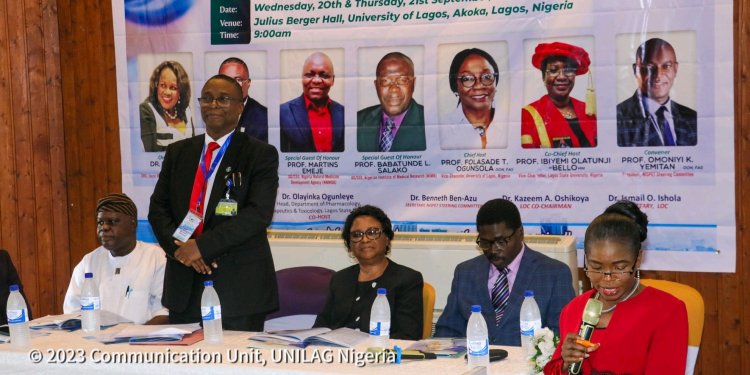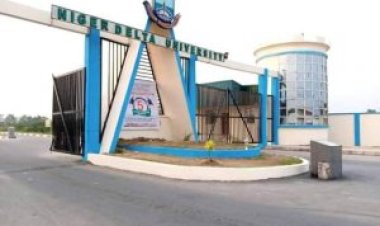Professor Owunari A. Georgewill Charges Pharmacological Scientists To Wake Up
UNIPORT VC Professor Owunari A. Georgewill at UNILAG charges all pharmacological scientists to wake up in the knowledge of their field.

UNIPORT VC Professor Owunari A. Georgewill at UNILAG charges all pharmacological scientists to wake up in the knowledge of their field.
The Vice-Chancellor, University of Port Harcourt (UNIPORT), Professor Owunari A. Georgewill has called on all pharmacological scientists to take the knowledge of their field of expertise outside the classroom, into the Nigerian community.
He made the call at the maiden Annual Scientific Conference and General Meeting of the Nigerian Society for Pharmacological Sciences and Experimental Therapeutics (NISPET), jointly hosted by the Departments of Pharmacology, Therapeutics and Toxicology of the University of Lagos (UNILAG) and Lagos State University (LASU).
The 2-day event tagged EKO 2023, commenced on Wednesday, September 20, 2023 at the Julius Berger Hall, UNILAG, Akoka. It featured several scientists and researchers of international repute who shared their knowledge and experiences on the sub-themes of the Conference which are as follows: Drug Discovery, Development and Repurposing for Enhanced Pharmacotherapeutic; Therapeutics and Translational Research; Natural Products and Herbal Medicines Development; Communicable and Noncommunicable Diseases: Antimicrobial Resistance, Pharmacogenetics and Targeting Inflammation; and Substance Abuse, Pharmacovigilance, Drug Safety and Toxicity.
Delivering a keynote address, titled: Enhancing Pharmacological Sciences Deliverables in Nigeria within the Context of Global Best Practices Professor Georgewill asserted that it was high time pharmacological scientists awoke from the lull of simply being teachers that graduate students and award academic degrees, to being crusaders for pharmacovigilance.
According to him, one of the problems impeding the deliverables of pharmacology in Nigeria is that there are inadequate systems for tracking and reporting adverse drug reactions, which can otherwise be referred to as a lack of proper post-marketing surveillance and pharmacovigilance.
The Professor of Pharmacology and Toxicology pointed out that pharmacological scientists can make a world of difference by helping Nigerian citizens and inhabitants understand the type of drugs they are exposed to; the importance of adhering to medications prescribed by their physicians; when to report adverse effects of a drug; who to report to; and the risk of using unlicensed drugs.
Beyond enhancing pharmacological sciences deliverables, Professor Georgewill affirmed that stepping out of their comfort zones and interacting with the community remained a dependable approach to improving the relevance of pharmacologists within the healthcare industry of the nation. He explained that this can be achieved through the promotion of timely issuance of information about the safety of health products to patients, health-care professionals, and the public.
He highlighted challenges and workable solutions within the context of global best practices to issues trailing the enhancement of pharmacological sciences deliverables in Nigeria. These challenges and solutions include:
S/N Challenges Solutions
1. Limited local drug manufacturing Promotion of local medicines production by offering financial incentives, tax breaks, and assistance to pharmaceutical firms. In addition, simplify legal procedures to aid regional production.
2. Regulatory and quality control issues in the pharmaceutical industry Strengthening regulatory organisations like NAFDAC to enhance oversight and impose more stringent quality control standards. Collaboration with global regulatory organisations is another useful strategy to improve expertise in this area.
3. Research and development gap Encouraging public-private collaborations to finance scientific projects. Give academic institutions grants for research, and provide financial incentives for drug corporations to spend money on Research and Development.
4. Inadequate infrastructure and supply chain challenges Making investments in modernising cold storage facilities, transportation, and infrastructure. In order to guarantee the prompt availability of pharmaceuticals, implement contemporary inventory management and distribution systems.
5. Problems with intellectual property Devising ways to safeguard pharmaceutical innovations, strengthen intellectual property laws and enforcement. Make the atmosphere favourable for trademarks and patents.
6. Lack of access to essential medicines and high drug costs Developing measures, including price limits or subsidies as appropriate, to provide fair access to pharmaceuticals. To lessen the financial burden associated with drug use, implement universal health coverage.
7. Drug development is hampered by a lack of information on regional illness trends and inadequate clinical trials. Providing support and financing local clinical trials to produce local data. To achieve worldwide clinical trials, promote cooperation with foreign research organisations.
8. A lack of qualified specialists, particularly in the molecular or mechanistic aspects of pharmacology Striving to create a skilled workforce, invest in education and training programmes. Offer specialised trainings and research opportunities by working with universities and other organisations.
In her remarks, the Deputy Director General of the Nigerian Institute of Medical Research (NIMR), Professor Olaoluwa P. Akinwale, who represented the Director General/CEO, NIMR, Professor Babatunde L. Salako at the event, lauded the insightful keynote address by Professor Georgewill, and encouraged student-participants to seize the opportunity provided by the gathering to network and connect with potential mentors.
Her words: “What you will achieve in ten (10) months on your own, you will achieve in just one (1) month with the right kind of mentorship.”
Professor Akinwale shared the belief of the DG of NIMR on the importance of seminars, workshops, conferences among others. While reminding Nigerians that the first case of HIV/AIDS was diagnosed by the Institute in 1986, she conveyed the DG’s hope that NIMR would be able to make use of outcomes of the 1st NISPET scientific conference to improve research.
The President, International Union of Basic and Clinical Pharmacology (IUPHAR), Professor Ingolf Cascorbi, intimated the gathering with the activities of IUPHAR in providing a basis for global scientific exchange. He wished NISPET success in its first conference, and shared his hopes that NISPET would continue to thrive and prosper, just as the Society’s link with IUPHAR deepens.
Similarly, the Vice-Chancellor, University of Lagos (UNILAG), Professor Folasade T. Ogunsola, OON, FAS, represented by the Deputy Provost, College of Medicine, University of Lagos (CMUL), Professor Osaretin A. Ebuehi, warmly welcomed the keynote speaker, Professor Owunari Georgewill; other dignitaries and attendees to the conference.
Professor Ebuehi relayed Professor Ogunsola’s appreciation to NISPET for choosing the University of Lagos to host the Society’s 1st Annual Scientific Conference and General Meeting in collaboration with Lagos State University (LASU).
He acquainted the gathering with the University’s commitment to seek out and foster additional collaborations and partnerships, which would enable the advancement of groundbreaking multidisciplinary research output aimed at enhancing quality of life.
Subsequently, he shared Professor Ogunsola’s wishes for fruitful discussions at the conference and her hope for an improved Nigeria stemming from the outcome of this epochal meeting of pharmacological scientists.
Representative of the Vice-Chancellor, Lagos State University (LASU), Professor Ibiyemi Olatunji-Bello, the Deputy Vice-Chancellor (Academic), LASU, Professor Olufunsho A. Omobitan, congratulated NISPET for organising its first conference. He extended Professor Olatunji-Bello’s commendation of the Society for choosing the EKO 2023 tag, which pays homage to Lagos State (Èkó), the economic nerve centre of the country.
He conveyed the Vice-Chancellor’s encouragement to participants to devise avenues of shaping the future of pharmacological sciences in Nigeria through the conference.
Delivering the Welcome Address, President of the Nigerian Society for Pharmacological Sciences and Experimental Therapeutics (NISPET), Professor Omoniyi K. Yemitan, disclosed that the essence of holding the conference and general meeting was to exchange knowledge and experience in the fields of Pharmacology/Pharmacological Sciences, and their application in Experimental Therapeutics.
The Heads of Department of Pharmacology, Therapeutics & Toxicology, UNILAG and LASU, Professor Abidemi J. Akindele and Dr. Olayinka Ogunleye delivered the event’s Opening Remarks and Vote of Thanks, respectively. Professor Akindele, on behalf of the Local Organising Committee (LOC) members, expressed immense gratitude to all pre-conference and conference speakers, participants and well wishers of the maiden scientific conference.
The Opening Ceremony of EKO 2023 was concluded with presentation of awards to the keynote speaker, Professor Owunari A. Georgewill, who is also a member of NISPET Board of Trustees and other members of the Board: Professor Olufunmilayo O. Adeyemi; Professor Peter A. Akah; Professor Karniyus S. Gamaniel and Professor Ezekiel O. Iwalewa.
A group photograph session of NISPET Board, Executives, LOC members and conference attendees ensued.
MySchoolNews reporting.

 Emelie
Emelie 



